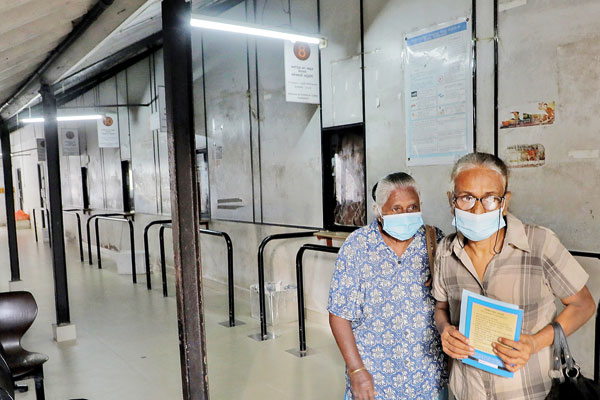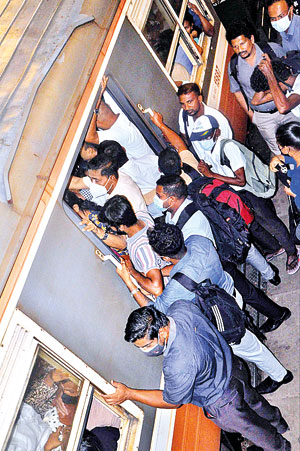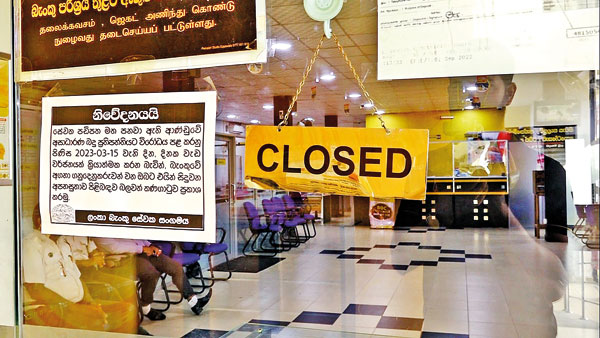News
Strike makes a dent amid claims and counterclaims
View(s):
National Hospital Colombo: Just two among thousands badly affected islandwide by the strike by doctors.Pic by M.A. Pushpa Kumara
By Senuka Jayakody
S. Shyamani, 61, a resident of an elderly home, arrived at Colombo National Hospital at 6. 30 a.m. only to find out that doctors and healthcare workers are on strike.
She has an infection in her leg and had to return to Mattakkuliya in a three-wheeler and feared that she may not be able to find money for another trip to the hospital.
S. M. Sundaram, 60, from Dematagoda, had a catheter inserted on March 6 and was asked to see the doctor on March 15, but there was no one to attend to her.
These were just two among thousands badly affected by the Wednesday strike.

Fort railway station: Many risked their lives riding on the sides of locomotives. Pic by Nilan Maligaspe
Apart from healthcare, education, transport, state banks, postal services, and tourism were among services affected.
The Government said that out of a workforce of about 650,000 about 420,000 stayed away. They accounted to 65% of the workers that went on strike.
Education and the postal services, where more than 90% kept away from work, were the worst affected. In the health sector, about half reported to work.
The spokesman of the Government Medical Officers Association, Chamil Wijesinghe said the strike was 100% successful with hospitals islandwide participating. Emergency, maternal care, cancer, kidney and other services were not affected.
Patients who had come on Wednesday were given new appointments. But some turned up again on Thursday for treatment.
The Government Medical Laboratory Technologists head, Ravi Kumudesh, said the strike was “the most successful and largest strike in history”, and that all trade unions supported it.
Many medical institutions, roughly 640, went on strike and only the most immediate medical tests had been done on Wednesday.
The president of the Government Medical Officers Forum, Rukshan Bellana, representing a rival union of the GMOA, said 85% of the doctors of all major hospitals reported to work on Wednesday.
Only a few clinics and outpatient departments (OPDs) in the National Hospital were affected, he said, explaining that doctors of the OPDs do not work anyway and they treat strike days as personal leave.
Dr. Bellana accepted that patients were affected. He said re-scheduling would occur “naturally”.
The general secretary of the Ceylon Teachers Service Union, Mahinda Jayasinghe, said almost all of the 10,165 schools were closed. “A few teachers and students were reported to have come to school, but that had no big impact.’’ The strike was 100% successful, he noted.
The chairman of the Federation of University Teachers Association, Shyama Banneheka said the strike was successful with all universities participating.

A bank in Anuradhapura on Wednesday : Pic by Thisara Samal
They hope to resume activities by early next week since a positive response is expected from the Government. Exams are expected to resume.
“How do education unions strike and get the schools closed and call it a success,’’ Minister of Education Susil Premajayantha asked.
The president of the Locomotive Operating Engineers Union, K. A. U. Konthasinghe said fewer than 20 train trips operated, compared with 300 a day. said the strike was a “100% success”.
Some people were seen risking their lives riding on the sides of locomotives.
A 90% decrease in the attendance of school children had been observed.
The general manager of Sri Lanka Railways, W. A. D. S. Gunasinghe said locomotive drivers not linked with the unions operated 21 trips on Wednesday. “Trains provide low-cost transport for passengers and goods. If it becomes disrupted, it is a damage done to the country.’’
The Sri Lanka Transport Board chairman S. M. D. L. K. D. Alwis said that among eight trade unions, only one union had joined the strike. He had asked the trade unions not to strike and seven unions had agreed.
Only a slight decrease in the number of buses was observed — 4,553 buses operated on Wednesday compared with 4,700 to 4,750 that run usually.
The decrease was due to school buses such as “Sisu Seriya” not running, he said.
The secretary of the All Island Three-wheeler Drivers Union, T. R. R. Pallie admitted that incomes had increased as people opted to hire trishaws instead of worrying about buses. This also helped drivers to make up lost income from school hires.
Channa Dissanayake, the chairman of the Ceylon Bank Employees Union, said the strike was 70% successful, with a “huge impact” and they conveyed their message to the Government successfully.
Private banks operated “some services’’ supported by contract workers and interns.
However, the Pragathi Bank Employees Union secretary, A. K. Bandara said 275 branches of the Bank of Ceylon and 290 branches of the People’s Bank, including all in Northern and Eastern provinces were open and that employees of private banks were also working, “behind doors”.
Some banks in Ampara were closed, while managers were absent at others. Pawning centres were open only in major towns.
Mr. Bandara sad there was enough staff and customers were not inconvenienced.
A spokesman for the Association of Importers of Essential Commodities said transactions were hindered because there were fewer workers in banks, except for foreign banks. Clearing of cargo was held up.
The Postal Trade Union Front Convener, Chintaka Bandara said the strike was a 100% success with all postal offices closed on Wednesday.
He estimates that revenue to the Government would have dropped by 5% to 6%. A backlog of around 500,000 letters may have built up and it would be cleared by the end of Thursday.
| Marking of exam answer scripts likely to begin The Commissioner General of the Department of Examinations, Ajith Jayasundara said he will be recalling lecturers on Monday to start marking of answer scripts. The Minister of Education, Susil Premajayantha told Parliament last week that the Ordinary Level examination could be be put off due to the delay in marking Advanced Level answer scripts. Also, addressing the media on Thursday, he said Rs 40 million has been allocated for the marking of answer scripts. However, the chairman of the Federation of University Teachers Association, Shyama Banneheka said he had not heard of such an | |
The best way to say that you found the home of your dreams is by finding it on Hitad.lk. We have listings for apartments for sale or rent in Sri Lanka, no matter what locale you're looking for! Whether you live in Colombo, Galle, Kandy, Matara, Jaffna and more - we've got them all!

